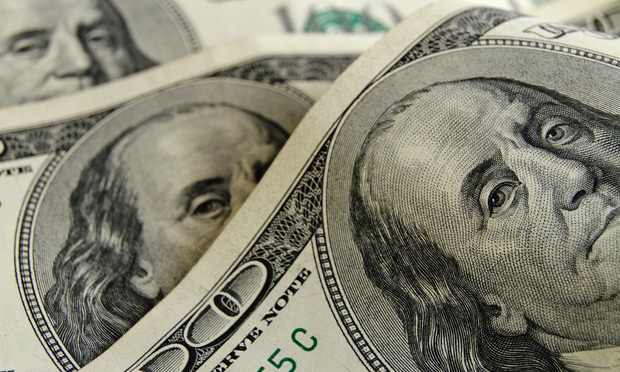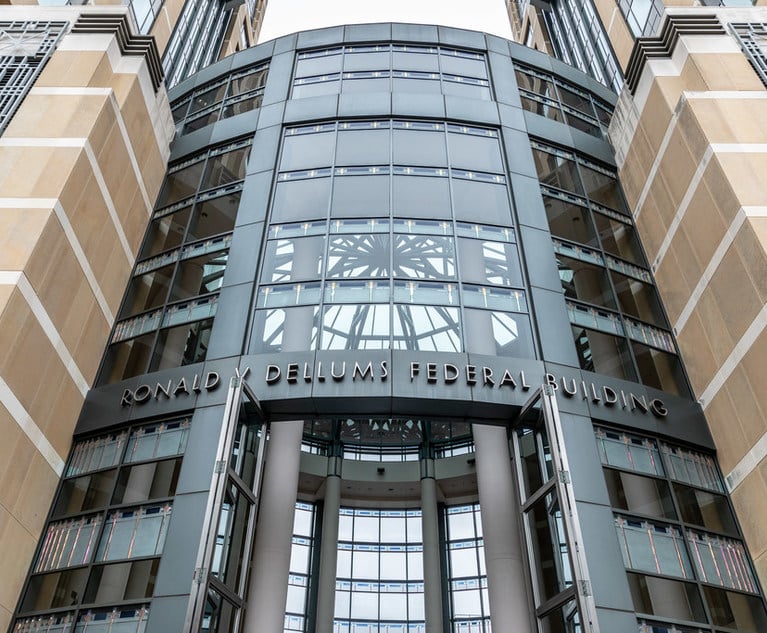Top 100 Verdicts: Appeal to Jurors' Emotions
A multi-billion dollar verdict involving breaches of fiduciary duty scores the top award in the 2017 list by NLJ-affiliate VerdictSearch.
April 30, 2018 at 05:40 PM
9 minute read

A lawyer behind the largest jury verdict of the year put his client—a millionaire widow suing a banking behemoth—on the stand for nearly four days.
That's a long time in front of a jury, any way you slice it. But Alan Loewinsohn, a senior partner at Loewinsohn Flegle Deary Simon in Dallas, realized he needed this time for the jury to get the whole picture of his client, Jo Hopper, who claimed JP Morgan grossly mishandled her late husband's $26 million estate.
“It would be very easy for someone to say, 'I don't care if she was wronged. She's still got millions of dollars, and I don't,'” Loewinsohn said. “Obviously, we worked with Jo before coming into the courtroom so that she could try and describe her ordeal in words that would resonate with the jury. But we also had to not shy away from the fact that she had substantial assets.”
In Hopper v. JP Morgan Chase Bank, N.A., a Texas jury awarded $8.04 billion to the widow and children of the late Max Hopper, an information technology pioneer and executive who developed an airline reservation system in the 1970s that became the industry standard.
Loewinsohn gave his client credit for being able to “shine through and get people to care” about her and about the wrongs she had suffered.
The Hopper family alleged that the bank not only incompetently administered the estate, taking years to distribute some assets but also improperly spent the estate's own money to resist the family's efforts in court to have the bank removed as administrator. The verdict included $8 billion in punitive damages.
While the monetary award is enough to place this verdicts in the No. 1 spot on VerdictSearch's Top 100 Verdicts of 2017, it also serves as a good example of how to appeal to jurors. Loewinsohn said Hopper and her husband came from humble beginnings and had worked hard for everything they had—personal attributes he aimed to get across to her peers deciding the outcome. He knew he had to keep her on the stand “to provide enough exposure to the jury to make her credible and likable and relatable,” he said.
The No. 2 verdict for the year is a distant second place, with an award of $500 million to a video game company and its subsidiary against a subsidiary of social media giant Facebook. The plaintiffs in Zenimax Media Inc. v. Oculus VR Inc. claimed that Oculus stole their source code and other intellectual property to develop commercially viable virtual reality products.
Tony Sammi, head of intellectual property litigation at Skadden, Arps, Slate, Meagher & Flom, was lead counsel for the plaintiffs. He said his most important task, besides making complicated technology relatable in layman's terms, was demonstrating that the plaintiffs' technology was essential to Oculus' products.
“At every opportunity, we made sure to map the behavior with the technology. In other words, in one timeline we'd see the progress defendants were making in their technology, and in another timeline, we'd see when they obtained our clients' technology. We then showed where those timelines matched up.”
The case was also noteworthy as the first-ever appearance of Facebook founder Mark Zuckerberg in open court. “We had an overflow courtroom,” Sammi recalled. “The media was there, which made it particularly challenging to focus on the case at hand amidst all the noise.”
So what did Sammi keep in mind in order to stay focused?
“Remember the jury. Nine people in that box. They are listening to the questions and the answers, and need clarity from us to be able to tune everything else out.”
No. 3 on this year's Top 100 was a $454 million award to a surgical center that claimed a maker of surgical gowns and a spinoff company fraudulently misrepresented the gowns' efficacy in protecting from such diseases as Ebola and HIV. Shahinian v. Kimberly-Clark Corp. was a class action, but only one plaintiff, Bahamas Surgery Center, was still in the case at the time of trial.
Michael Avenatti, co-founder of the Newport Beach, Calif., litigation boutique Eagan Avenatti, was lead counsel for the plaintiff. He said the most challenging aspect of the case was that Kimberly-Clark had virtually unlimited resources. “They spent over $50 million defending the case,” he said.
Another difficulty was that the court limited each side to just 12 hours of court time, exclusive of opening and closing, to present its case. In a fraud class action with these complicated issues, putting on your evidence in that time is nearly impossible, Avenatti said.
On the other hand, the ability to adapt and react to such circumstances is what makes a winning trial lawyer, Avenatti said. “If you can't take a punch, you don't belong in the ring.”
In 2016, there were three talc verdicts—claims that Johnson & Johnson's baby powder containing talc caused ovarian cancer—that made the Top 100. This year, two supersized verdicts in talcum powder litigation returned.
The biggest talc award ranks at No. 4 on this year's list, a $417 million verdict in Lloyd v. Johnson & Johnson. Mark Robinson of Robinson Calcagnie, in Newport Beach, Calif., represented Eva Echeverria, the only plaintiff still in the case at the time of trial. She died from cancer a month after the Aug. 21 verdict.
Robinson had an uphill battle, as “the majority of the rulings went against us,” he said, but several factors enabled him and his team to battle back and win a verdict.
His client was in the hospital, but she was able to attend voir dire and thank the jurors in person for their service. She had to go back to the hospital the next day, but Robinson played her video deposition during the trial, and it brought many in the courtroom to tears, he said.
Her testimony showed “how much she cared about other people and just was a good person,” he said.
Another key factor was the testimony of the treating oncologist, whom Robinson described as an “amazing” witness despite having never testified before. “Causation is always the big issue in these cases. She really did a very good job of explaining it to the jury.” And on cross-examination, he said, “She got even better.”
Robinson's win was one of 21 products liability verdicts for this year's Top 100, making it the largest category on the list, for a total of $1.58 billion in award dollars. The second-highest category is motor vehicle suits, with 19 verdicts for a total of $886 million. The third-highest category is medical malpractice, with 12 verdicts totaling $361 million. Worker/workplace negligence comes next, with nine verdicts totaling $436 million. There are eight breach-of-contract cases on the list, totaling $442 million and eight intellectual property cases, totaling $854 million.
At No. 8 on this year's verdicts, six plaintiffs were awarded $247 million in Alicea v. DePuy Orthopedics Inc. It's the fourth bellwether trial over metal-lined hip implants made by DePuy. About 9,300 similar lawsuits have been consolidated in multidistrict litigation before U.S. District Judge Ed Kinkeade. The plaintiffs alleged severe health problems arising from the friction-related shedding of microscopic metal ions from the implants into surrounding tissues.
Winning attorney Mark Lanier, of The Lanier Law Firm in Houston, said one key to the case, as well as the reason the trial took almost three months, was that he made sure that the jury had all the information that the defendants had about the implants.
“I used every teaching tool I could think of,” Lanier said. “I drew pictures on the Elmo, used a large pad, used props ranging from boxes of donuts to large blocks of rock salt and jars of marbles.”
The biggest challenge, Lanier said, was “clearing up the confusion caused by the defendants cherry-picking data and science to support their actions.”
“If [the defendants] showed an excerpt from an article, I would show what they left out,” he said. “If they hand-selected one piece of science, I would show the 15 they ignored.”
The ninth-largest verdict this year, Signature Associates LLC v. International Paper, was a $246 million award to an industrial services contractor and its founder. The plaintiffs alleged that International Paper, the world's largest pulp and paper company, had no intention of paying Signature, a small contractor, for work at its paper plant. The delays and nonpayment sent Signature into a financial tailspin that gave it a negative balance sheet and prevented its sale to a private equity firm for $42 million.
Glen Morgan, managing partner of Reaud, Morgan & Quinn, was lead counsel for Signature, and Wyatt Snider, of Snider Law Firm, represented Signature's founder and president, Jeff Ogden. Morgan and Snider said the biggest challenge in a commercial case is to make it about something other than just numbers. Morgan explained, “You have to make a case real. It's got to be about people, and it's got to be about their feelings.”
Morgan and Snider were able to put a sympathetic face on the corporate plaintiff. Ogden, a former construction worker with a high school education, had started the company with only a credit card and his knowledge and contacts.
“It really just turned into a David and Goliath kind of case,” Morgan said.
He noted that four of the jurors cried during closing argument.
“It's hard to get a jury to cry in a commercial case,” he said.
This content has been archived. It is available through our partners, LexisNexis® and Bloomberg Law.
To view this content, please continue to their sites.
Not a Lexis Subscriber?
Subscribe Now
Not a Bloomberg Law Subscriber?
Subscribe Now
NOT FOR REPRINT
© 2025 ALM Global, LLC, All Rights Reserved. Request academic re-use from www.copyright.com. All other uses, submit a request to [email protected]. For more information visit Asset & Logo Licensing.
You Might Like
View All
Crypto Exchange’s ‘Meteoric Rise’ Leads to Nationwide Class Action Trend
4 minute read
'The Tobacco Industry of This Decade': Slew of Class Actions Accuse DraftKings of Creating Addicts
5 minute read
Pentagon Settles Suit Seeking to Clear Records of Service Members Discharged for Being LGBTQ
3 minute readTrending Stories
Who Got The Work
J. Brugh Lower of Gibbons has entered an appearance for industrial equipment supplier Devco Corporation in a pending trademark infringement lawsuit. The suit, accusing the defendant of selling knock-off Graco products, was filed Dec. 18 in New Jersey District Court by Rivkin Radler on behalf of Graco Inc. and Graco Minnesota. The case, assigned to U.S. District Judge Zahid N. Quraishi, is 3:24-cv-11294, Graco Inc. et al v. Devco Corporation.
Who Got The Work
Rebecca Maller-Stein and Kent A. Yalowitz of Arnold & Porter Kaye Scholer have entered their appearances for Hanaco Venture Capital and its executives, Lior Prosor and David Frankel, in a pending securities lawsuit. The action, filed on Dec. 24 in New York Southern District Court by Zell, Aron & Co. on behalf of Goldeneye Advisors, accuses the defendants of negligently and fraudulently managing the plaintiff's $1 million investment. The case, assigned to U.S. District Judge Vernon S. Broderick, is 1:24-cv-09918, Goldeneye Advisors, LLC v. Hanaco Venture Capital, Ltd. et al.
Who Got The Work
Attorneys from A&O Shearman has stepped in as defense counsel for Toronto-Dominion Bank and other defendants in a pending securities class action. The suit, filed Dec. 11 in New York Southern District Court by Bleichmar Fonti & Auld, accuses the defendants of concealing the bank's 'pervasive' deficiencies in regards to its compliance with the Bank Secrecy Act and the quality of its anti-money laundering controls. The case, assigned to U.S. District Judge Arun Subramanian, is 1:24-cv-09445, Gonzalez v. The Toronto-Dominion Bank et al.
Who Got The Work
Crown Castle International, a Pennsylvania company providing shared communications infrastructure, has turned to Luke D. Wolf of Gordon Rees Scully Mansukhani to fend off a pending breach-of-contract lawsuit. The court action, filed Nov. 25 in Michigan Eastern District Court by Hooper Hathaway PC on behalf of The Town Residences LLC, accuses Crown Castle of failing to transfer approximately $30,000 in utility payments from T-Mobile in breach of a roof-top lease and assignment agreement. The case, assigned to U.S. District Judge Susan K. Declercq, is 2:24-cv-13131, The Town Residences LLC v. T-Mobile US, Inc. et al.
Who Got The Work
Wilfred P. Coronato and Daniel M. Schwartz of McCarter & English have stepped in as defense counsel to Electrolux Home Products Inc. in a pending product liability lawsuit. The court action, filed Nov. 26 in New York Eastern District Court by Poulos Lopiccolo PC and Nagel Rice LLP on behalf of David Stern, alleges that the defendant's refrigerators’ drawers and shelving repeatedly break and fall apart within months after purchase. The case, assigned to U.S. District Judge Joan M. Azrack, is 2:24-cv-08204, Stern v. Electrolux Home Products, Inc.
Featured Firms
Law Offices of Gary Martin Hays & Associates, P.C.
(470) 294-1674
Law Offices of Mark E. Salomone
(857) 444-6468
Smith & Hassler
(713) 739-1250











